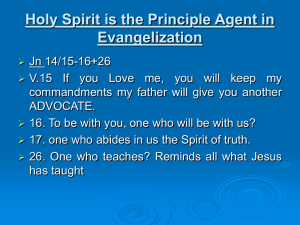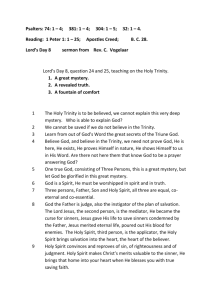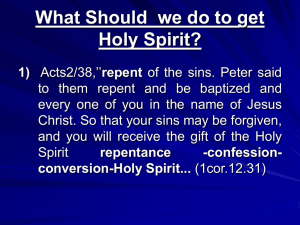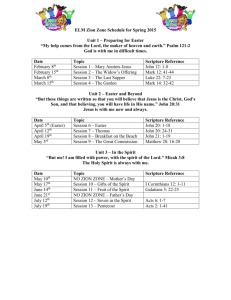Canterbury United Methodist Church
advertisement
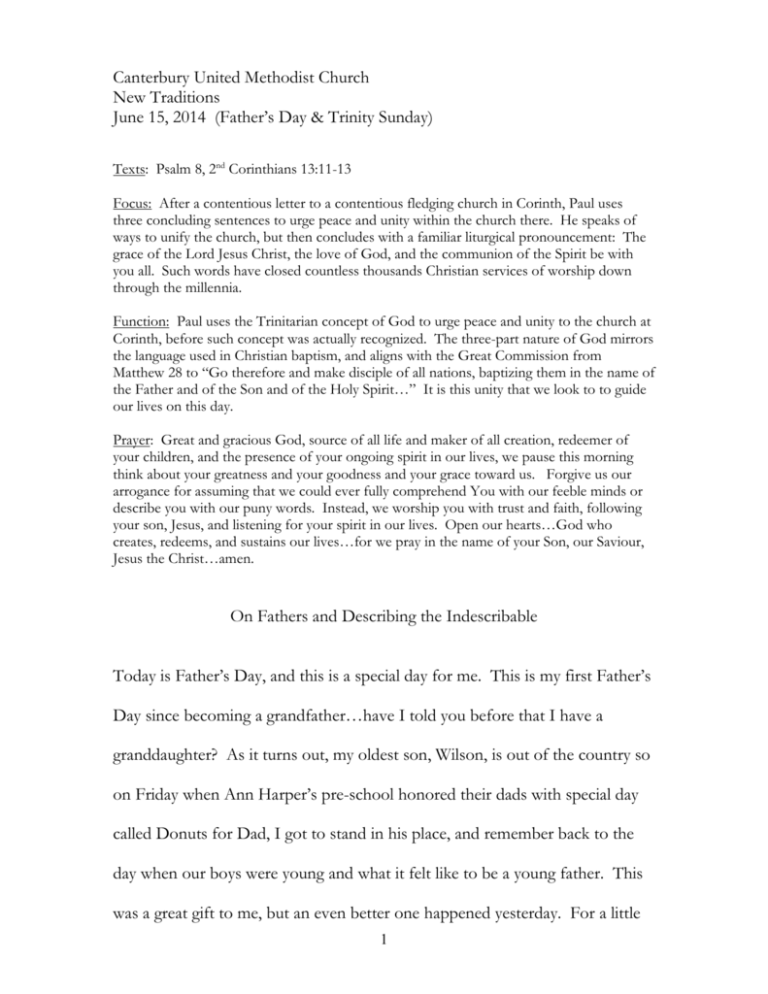
Canterbury United Methodist Church New Traditions June 15, 2014 (Father’s Day & Trinity Sunday) Texts: Psalm 8, 2nd Corinthians 13:11-13 Focus: After a contentious letter to a contentious fledging church in Corinth, Paul uses three concluding sentences to urge peace and unity within the church there. He speaks of ways to unify the church, but then concludes with a familiar liturgical pronouncement: The grace of the Lord Jesus Christ, the love of God, and the communion of the Spirit be with you all. Such words have closed countless thousands Christian services of worship down through the millennia. Function: Paul uses the Trinitarian concept of God to urge peace and unity to the church at Corinth, before such concept was actually recognized. The three-part nature of God mirrors the language used in Christian baptism, and aligns with the Great Commission from Matthew 28 to “Go therefore and make disciple of all nations, baptizing them in the name of the Father and of the Son and of the Holy Spirit…” It is this unity that we look to to guide our lives on this day. Prayer: Great and gracious God, source of all life and maker of all creation, redeemer of your children, and the presence of your ongoing spirit in our lives, we pause this morning think about your greatness and your goodness and your grace toward us. Forgive us our arrogance for assuming that we could ever fully comprehend You with our feeble minds or describe you with our puny words. Instead, we worship you with trust and faith, following your son, Jesus, and listening for your spirit in our lives. Open our hearts…God who creates, redeems, and sustains our lives…for we pray in the name of your Son, our Saviour, Jesus the Christ…amen. On Fathers and Describing the Indescribable Today is Father’s Day, and this is a special day for me. This is my first Father’s Day since becoming a grandfather…have I told you before that I have a granddaughter? As it turns out, my oldest son, Wilson, is out of the country so on Friday when Ann Harper’s pre-school honored their dads with special day called Donuts for Dad, I got to stand in his place, and remember back to the day when our boys were young and what it felt like to be a young father. This was a great gift to me, but an even better one happened yesterday. For a little 1 while, it was my sole responsibility to care for Anne Harper…the first time that’s ever happened and I remembered some of the anxiety of wondering whether I could really take care of this tiny bundle properly by myself. Ann Harper responded by promptly falling asleep on my shoulder, which was absolutely the best Father’s Day present she could have given me. This is also the first Father’s Day since my own dad passed from this life and joined the communion of the saints. I have a whole string of voice mail messages from him on my phone that I can’t bear to erase. I feel his absence today and I miss him. In the great church all over the world, today is also Trinity Sunday. It always falls on the first Sunday after Pentecost, and many preachers dread this day because they know they will have to stand in their pulpits again and try to explain what is basically unexplainable…what God’s nature is and how it shows up in three parts in our lives. Let me say that I approach this topic with a great deal of humility, because I feel very unqualified and insufficient to explain all this fully to you, so I can only try to share with you how I think about this. But let me let you in on a secret…those other preachers preaching about the Trinity…they don’t understand this fully either. Oh, it’s not that they haven’t studied it in seminary…and written papers on the consubstantial nature of the 2 Godhead, listened to endless lectures on why the Greek term homoousios (which means to be of one substance) how that defines the central character of God’s nature. Hang on now…we’re going to the deep end of the pool! There’s a lot of history behind this God in three persons business. It started in the first century, in the 28th chapter of Matthew, just before he ascends to heaven, Jesus tells his disciples to “go therefore and make disciples of all nations, baptizing in the name of the Father, and the Son, and the Holy Spirit.” We still use that language in our baptismal liturgy today. It continued with the early church in the second and third centuries. Names like Theophilus of Antioch, who first used the word to describe God’s role in creation. He first defined the Trinity as God, His Word (Logos), and His wisdom (Sophia). Later, Tertullian, Athaniasius, and Gregory of Nyssa, who were early church fathers, all contributed their thought and ideas. More conversation and debate ensued until the Fourth Lateran Council finally declared that “it is the Father who generates, the Son who is begotten, and the Holy Spirit who proceeds, and in their relations with one another, they are “one in all else, co-equal, co-eternal and consubstantial,” and that “each is God, whole and entire.” There…that certainly clears things up, doesn’t it! But the arguments and debate about the Trinity didn’t stop there…the Great East/West split in the church, where the Roman Catholic church divided itself 3 from the Eastern Orthodox church, basically was over how the Spirit relates to the Father and the Son. What does all that mean? And with all that history, it’s a pretty important concept today too…the concept of God as three persons is foundational and unique to our faith…it is part of makes us Christians. We consider ourselves to be a monotheistic faith…followers of one God, like our Jewish and Muslim friends are, but they look at us and wonder how we can be when it looks like to them that we worship three Gods…instead of one. If you are a little confused about all this, consider yourself to be in good company! Stepping back from all this history, my somewhat cynical view is that a lot of humans have spent a lot of time trying to describe something that is essentially indescribable. Why? In the scope of all creation and the great span of time since it began, we are but tiny specks of dust. We like to think that we are hugely important and that we are great thinkers, but in reality, we are tiny specks of dust…here only for a short time. And with that humbling thought, my thought is that we have tiny pea brains (in relation to God) and a limited language with which to think and speak of God. The reality of this goes so far beyond our capabilities to understand. When we speak of the Trinity, we are trying to speak the unspeakable and comprehend the uncomprehendable. 4 So, in all humility, here is how I understand this with my little pea brain: God the Father is the face of God that created our world and gave us life. As you look around at the natural beauty of the planet on which we live, and encounter all living things that inhabit it, God is the origin of all that. I understand God the Son to be the incarnate human being, Jesus, who even being the timeless second person of the Trinity, walked the earth in the first century, who lived, died from crucifixion by the Romans, and was resurrected on the third day. It is through Jesus’ life and teaching that we have our clearest picture of who God is. God the Holy Spirit is the part of God which is active and sustaining in the world and in our hearts today. The word used for God’s spirit is the Greek word pneuma, which means breath. Think of that…God’s spirit is God’s breath…in the creation story, God’s spirit moved upon the great waters, breathing life into creation…Jesus breathed into his disciples his Spirit, the spirit of Jesus…could it be that our breath is part of God’s Spirit…that the very process of breathing in and breathing out is part of the life sustaining nature of the Holy Spirit? My little pea brain thinks of God as being so big, that these three terms (Father/Son/Spirit) are simply ways that we can begin to boil all this down and comprehend how God relates to us and to our world. Now understand, that just because we think of it this way with our pea brains doesn’t mean that makes it the way it actually is! Our words and thoughts 5 don’t constitute reality for God…our words and thoughts don’t change God’s nature…we don’t constrain God with the way we understand our faith. The whole process works the other way around. Sometimes we forget this, I think. Here’s another analogy that kind of makes sense to me, and I will share this as long as you understand that I am not comparing myself to God: I am one human being…of one nature, one personality, one fundamental character. I was a son to Henry, who is now with his Father in heaven. I am a brother to Rick, who relates to me as a sibling. I am a father to Wilson and Graham and Dixon, who see me in a totally different light and with varying types of baggage, I might add. And I am a grandfather to Ann Harper, who really doesn’t know what to think about me yet, but we both love to make motorboat noises with our mouths when we are together! I am the same person, yet I interact in the lives of these different people differently…I play a different role with each of them. And maybe in a far more complex and magnificent way, God interacts differently in all of our lives, even as we draw our next breath. Paul used this language to give the fractious church at Corinth an example of what unity looks like. Because God’s essential nature for love and good is revealed in multiple ways, we humans have a better chance to understand what our God is really all about, we have a heads up to watch for God’s presence in the world, and we have a better chance to understand God’s image that is 6 implanted in each of us. Thought of in that way, today is truly a happy day of our Father. May God the Creator, God the Redeemer, and God the Sustainer be with you and walk beside you all the days of your life. Amen and amen. 7


